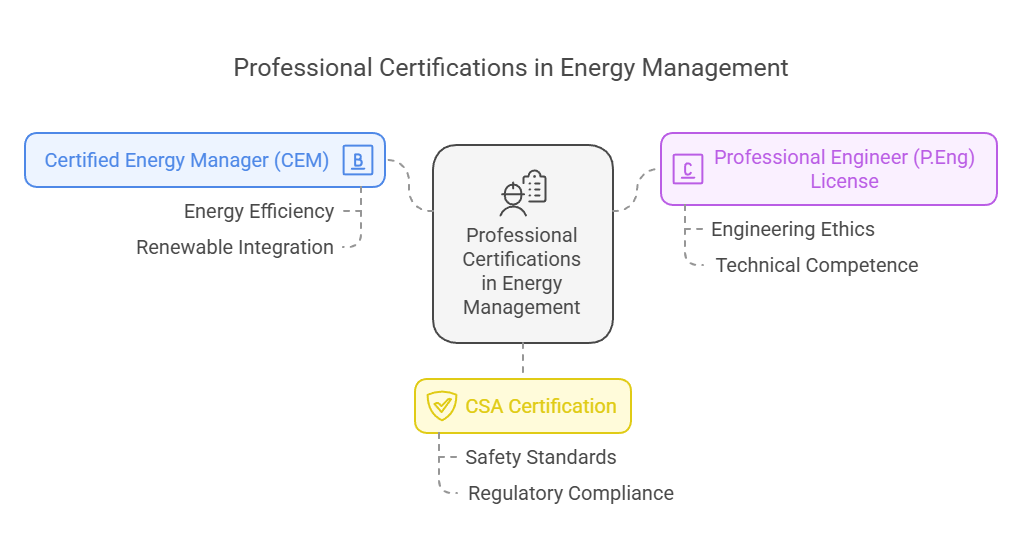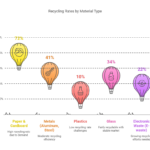In 2025, Canada’s energy systems are experiencing a rapid transformation driven by renewable energy integration, advancements in smart grid technologies, and an increasing emphasis on energy resilience. Amid these changes, the role of the Electrical Grid Analyst has become more crucial than ever. Professionals in this field are highly sought after to ensure the stability, efficiency, and sustainability of modern energy grids across the country.
What Is an Electrical Grid Analyst?
An Electrical Grid Analyst is a specialist tasked with monitoring, analyzing, and optimizing the performance of electrical power grids. Their expertise ensures the stability and efficiency of energy systems, prevents outages, and seamlessly integrates new energy sources such as wind, solar, and battery storage into the grid.
Key Responsibilities
- Real-Time Monitoring: Continuously oversee grid performance to identify and address issues before they escalate.
- Data Analysis: Optimize grid efficiency by minimizing energy losses through detailed data examination.
- Demand Forecasting: Predict electricity usage patterns to ensure supply consistently meets demand.
- System Upgrades: Collaborate with engineers and technicians to implement necessary grid enhancements.
- Renewable Integration: Incorporate renewable energy sources into traditional grid infrastructures effectively.
Essential Skills for Electrical Grid Analysts in 2025
As the energy sector becomes more dynamic, Electrical Grid Analysts must possess a diverse skill set to excel. Below are the core competencies essential for success in this role:
- Technical Knowledge
A deep understanding of power systems, renewable energy sources, and energy storage technologies is paramount. Key areas include:
- Grid Operation and Maintenance
- Load Flow Analysis and Demand Forecasting
- Integration of Distributed Energy Resources (DERs)
- Data Analytics and Software Expertise
Proficiency in data analytics and relevant software tools is critical. Analysts leverage:
- SCADA (Supervisory Control and Data Acquisition) Systems for real-time grid monitoring.
- Programming Languages: Python, MATLAB, and R for advanced data analysis.
- Machine Learning Algorithms for predictive modeling and anomaly detection.
- Problem-Solving Abilities
The ability to quickly diagnose and resolve grid issues is essential. This includes:
- Troubleshooting Problems
- Devising Effective Solutions
- Implementing Fixes Under Tight Deadlines
- Communication and Teamwork
Effective collaboration with engineers, policymakers, and IT specialists is necessary. Skills include:
- Clear Communication
- Interdisciplinary Teamwork
- Presentation of Technical Findings
- Understanding of Policy and Regulations
Staying informed about energy regulations and compliance standards is crucial. Analysts must grasp:
- Renewable Energy Incentives
- Carbon Reduction Goals
- Grid Reliability Requirements
How to Become an Electrical Grid Analyst
Embarking on a career as an Electrical Grid Analyst involves several key steps:
- Obtain a Relevant Degree
A bachelor’s degree in one of the following fields is typically required:
- Electrical Engineering
- Energy Systems
- Data Science
Other acceptable degrees: Physics or Computer Science, provided relevant experience is gained.
- Gain Technical Experience
Practical experience is invaluable. Consider:
- Internships: With utilities, power generation companies, or energy consulting firms.
- Entry-Level Roles: Focus on real-time grid operations and software tool usage.
- Develop Data Analysis Skills
Mastery of data analytics tools is essential. Focus on:
- SQL, Python, Tableau
- Certifications: In machine learning or data science to enhance your profile.
- Earn Certifications
Certifications can significantly boost credibility:
| Certification | Description |
| Certified Energy Manager (CEM) | Covers energy management best practices and renewable integration. |
| Professional Engineer (P.Eng) License | Required for advanced engineering roles in Canada. |
| CSA Certification | Essential for professionals adhering to Canadian standards. |

- Stay Updated on Industry Trends
Continuous learning is key. Engage in:
- Industry Conferences
- Energy Journals
- Online Courses
Electrical Grid Analyst Salary and Job Outlook in Canada, 2025
Average Salaries
Compensation varies based on experience, location, and employer. Below is the average salary range for 2025 in Canadian Dollars (CAD):
| Experience Level | Annual Salary Range |
| Entry-Level | $65,000 – $85,000 |
| Mid-Career Professionals | $90,000 – $120,000 |
| Senior Analysts & Managers | $130,000 – $160,000 |
Job Growth
The demand for Electrical Grid Analysts in Canada is projected to grow by 8% over the next decade, significantly above the average for all professions. Key growth drivers include:
- Increased Adoption of Renewable Energy
- Government Mandates for Grid Modernization
- Rising Concerns About Grid Cybersecurity
Trends Driving Demand for Grid Analysts
Several key trends are fueling the need for skilled Electrical Grid Analysts in Canada:
- Surge in Renewable Energy Integration
- Renewable energy is expected to account for over 55% of total electricity generation in Canada by 2025.
- Integration of intermittent sources like solar and wind requires precise planning and expertise.
- The Rise of Smart Grids
- Investments in smart grid technologies in Canada are projected to exceed $40 billion.
- Smart grids utilize sensors, automation, and advanced software to enhance reliability and efficiency.
- Growing Energy Storage Solutions
- Battery Energy Storage Systems (BESS) capacity in Canada is expected to surpass 400 GWh by 2025.
- Analysts manage storage assets to ensure seamless energy distribution.
- Increased Cybersecurity Threats
- With 70% of Canadian utilities experiencing cyberattacks in recent years, securing grid infrastructure is paramount.
- Collaboration with cybersecurity teams is a critical aspect of the analyst’s role.
Industries and Employers Hiring Electrical Grid Analysts
Electrical Grid Analysts find opportunities across various sectors in Canada:
- Utility Companies: Managing grid operations and ensuring reliable electricity supply.
- Renewable Energy Firms: Overseeing solar, wind, and battery storage integration.
- Government Agencies: Monitoring national energy grids and developing energy policies.
- Consulting Firms: Advising on energy efficiency and grid modernization projects.
- Technology Companies: Developing software and hardware for smart grid systems.
Notable Employers in Canada, 2025:
- Hydro-Québec
- Ontario Power Generation (OPG)
- BC Hydro
- Suncor Energy
- Enbridge Inc.
- Canadian Solar
- TransAlta
- National Energy Board (NEB)
Staffing Challenges and Opportunities for Electrical Grid Analysts
As the energy landscape evolves, staffing Electrical Grid Analysts presents both challenges and opportunities. Effective strategies are essential to attract and retain top talent.
The Increasing Need for Skilled Professionals
The complexity of modern energy grids in Canada demands analysts with specialized skills across multiple disciplines:
- Modernization of Aging Grids: Upgrading infrastructure to support renewable energy and advanced technologies.
- Integration of Distributed Energy Resources (DERs): Managing residential solar panels, EV chargers, and microgrids.
- Cybersecurity Threats: Protecting digital grid systems from cyberattacks.
- Government Mandates for Clean Energy: Achieving renewable portfolio standards (RPS) and net-zero emission targets.
According to the Canadian Renewable Energy Association (CanREA), the global energy workforce is expected to grow by 35% by 2030, with grid-related roles being among the most critical.
Challenges in Staffing Electrical Grid Analysts
- Talent Shortages
- STEM Education Gap: Limited graduates in engineering and technology fields.
- Industry Competition: High demand across IT, finance, and manufacturing sectors.
- Need for Specialized Skills
- Proficiency in power systems, SCADA, MATLAB, and machine learning is essential.
- Staying updated with evolving regulations further narrows the talent pool.
- Aging Workforce
- Approximately 25% of the utility workforce in Canada is nearing retirement.
- Significant knowledge gaps require the recruitment of younger talent.
- Regional Disparities
- Rural areas and smaller utilities struggle to attract top talent.
- Emerging markets in provinces like Alberta and Ontario face workforce development challenges.
Effective Recruitment Strategies
To address staffing challenges, organizations can implement the following strategies:
- Partnering with Educational Institutions
- Internship Programs: Provide hands-on experience in grid operations and analysis.
- Scholarship Programs: Sponsor STEM students, particularly in electrical engineering or data science.
- Curriculum Development: Collaborate with universities to offer courses on smart grids, renewable integration, and advanced analytics.
- Upskilling and Reskilling Initiatives
- Training Programs: Teach employees the latest tools and techniques, such as AI-driven analytics and cybersecurity best practices.
- Continuous Education: Encourage ongoing learning to keep pace with technological advancements.
- Leveraging Technology in Hiring
- AI-Powered Recruitment Platforms: Identify candidates with the right mix of skills and experience.
- Data-Driven Tools: Streamline the hiring process and predict candidate performance.
- Tapping into Global Talent Pools
- Remote Hiring: Utilize cloud-based tools and virtual SCADA systems to access international talent.
- Flexible Work Arrangements: Attract a wider range of candidates by offering remote or hybrid work options.

Retention Strategies for Electrical Grid Analysts
Once skilled professionals are hired, retaining them is crucial. Effective retention strategies include:
- Competitive Compensation
- Ensure salaries and benefits are aligned with market standards to attract and retain top talent.
- Career Development Opportunities
- Leadership Training: Prepare mid-level analysts for management roles.
- Certifications and Continuing Education: Support employees in obtaining certifications like CEM or P.Eng.
- Mentorship Programs: Facilitate knowledge transfer through pairing junior analysts with experienced professionals.
- Fostering a Collaborative Work Environment
- Promote teamwork between grid analysts, IT specialists, and engineers to enhance problem-solving capabilities.
- Work-Life Balance
- Offer flexible work arrangements, such as remote work or compressed workweeks, to improve job satisfaction and reduce burnout.
Diversity and Inclusion in Grid Analyst Roles
Diversity and inclusion (D&I) are increasingly important in the Canadian energy sector. A diverse workforce enhances innovation and problem-solving. Steps to improve diversity include:
- Encourage Women in STEM: Launch initiatives to attract more women to engineering and energy careers. Organizations like Women in Renewable Energy Canada (WREC) offer valuable resources.
- Target Underrepresented Groups: Develop outreach programs to engage diverse communities and provide access to training and mentorship.
- Promote Inclusivity in the Workplace: Create an environment where all employees feel valued, respected, and empowered to contribute.
The Role of Staffing Agencies in the Energy Sector
Specialized energy staffing agencies play a pivotal role in meeting workforce needs by:
- Identifying Qualified Candidates: Quickly finding suitable professionals for hard-to-fill roles.
- Providing Temporary Staffing Solutions: Addressing project-based staffing needs with tight deadlines.
- Offering Workforce Planning and Consulting Services: Helping organizations anticipate and prepare for future hiring demands.
Notable Energy Staffing Agencies in Canada:
- NES Global Talent
- Airswift
- Brunel Energy
- Randstad Canada
- Hays Energy
Building a Future-Ready Workforce
Creating a future-ready workforce involves a long-term commitment to workforce development, including:
- Investments in Education and Training: Support continuous learning and skill development.
- Diversity Initiatives: Foster an inclusive workplace to attract a wide range of talent.
- Leveraging Technology: Use advanced recruitment and training tools to streamline processes.
Organizations that prioritize these strategies will be better equipped to navigate the complexities of modern energy systems and achieve their organizational goals.
Challenges in the Field
While rewarding, the career of an Electrical Grid Analyst comes with its own set of challenges:
- Managing Renewable Intermittency: Balancing supply and demand as renewable energy sources fluctuate.
- Cybersecurity Risks: Protecting grids from evolving cyber threats.
- Aging Infrastructure: Upgrading decades-old grids in Canada requires significant investment.
- Rapid Technological Advancements: Staying ahead in an ever-changing field necessitates continuous learning.
The Future of Electrical Grid Analysts
The transition to renewable energy and advanced grid systems will continue to expand the scope of work for Grid Analysts in Canada. Future developments include:
- AI and Automation: Artificial intelligence will play a larger role in grid management, making it essential for analysts to work with automated systems.
- National Collaboration: As energy grids across provinces become more interconnected, analysts may engage in cross-provincial projects.
- Carbon Neutral Goals: Analysts will be pivotal in helping governments and organizations achieve carbon neutrality by 2050.
Final Thoughts
In conclusion, the role of Electrical Grid Analysts is more vital than ever in Canada in 2025. With the ongoing transformation of the nation’s energy systems, these professionals are at the forefront of ensuring reliable, efficient, and sustainable energy delivery. Whether you’re considering a career in this field or looking to hire top talent, understanding the evolving landscape and necessary skills is key to success.
As the demand for Electrical Grid Analysts continues to rise in Canada, finding the right talent to meet your organizational needs can be challenging. RSS Staffing Inc. specializes in providing tailored staffing solutions for the energy sector, including skilled Electrical Grid Analysts. With a deep understanding of the Canadian energy landscape and access to a diverse talent pool, RSS Staffing Inc. can help your company recruit top-tier professionals to drive innovation, efficiency, and sustainability in your grid operations. Partner with RSS Staffing Inc. to build a workforce that meets the demands of Canada’s evolving energy future.
Key Takeaways
- High Demand: Electrical Grid Analysts are essential for integrating renewable energy and modernizing Canada’s energy infrastructure.
- Competitive Salaries: Attractive compensation packages reflect the specialized skills required.
- Continuous Learning: Ongoing education and certifications are crucial to stay updated with industry trends.
- Diversity Matters: Promoting diversity and inclusion enhances innovation and problem-solving in the energy sector.
- Strategic Recruitment: Partnering with educational institutions and leveraging technology are effective strategies to overcome staffing challenges.
Resources for Aspiring Electrical Grid Analysts in Canada
- Engineers Canada: www.engineerscanada.ca
- Women in Renewable Energy Canada (WREC): www.wrec.ca
- Canadian Renewable Energy Association (CanREA): www.canrea.ca
- Hydro-Québec Careers: www.hydroquebec.com
- Ontario Power Generation (OPG) Careers: www.opg.com









